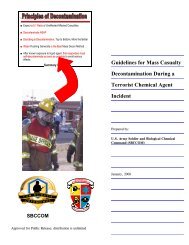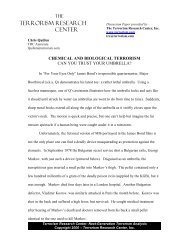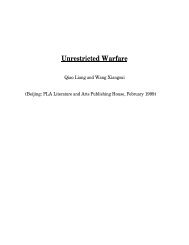Combating Proliferation of Weapons of Mass Destruction
Combating Proliferation of Weapons of Mass Destruction
Combating Proliferation of Weapons of Mass Destruction
You also want an ePaper? Increase the reach of your titles
YUMPU automatically turns print PDFs into web optimized ePapers that Google loves.
Executive SummaryEvery American should understand that weapons <strong>of</strong> mass destruction (WMD)—nuclear,biological, and chemical weapons and their means <strong>of</strong> delivery—pose a grave threat to theUnited States and to our military forces and our vital interests abroad. The most seriousthreats are:• Terrorist use <strong>of</strong> weapons <strong>of</strong> mass destruction against the United States or its allies;• Possession <strong>of</strong>, and the manufacturing infrastructure for, WMD by Iran, Iraq, North Korea,or other unfriendly states;• Diversion <strong>of</strong> WMD-related weapons, technology, materials, and expertise from Russia;• Transfer <strong>of</strong> nuclear, chemical, and biological weapons, delivery means, andtechnology by China; and• Destabilizing consequences <strong>of</strong> WMD programs in the Middle East, South Asia, and EastAsia.These threats define a chilling new reality for our country. Their magnitude and realityrequire a new strategy focused not just on prevention, but also on combating all aspects<strong>of</strong> proliferation, to include impeding the spread <strong>of</strong> capability, responding to proliferationas it occurs, strengthening our capacity to defend against such weapons, and preparing torespond if these weapons are used against us at home or abroad.Congress established this Commission to assess the organization <strong>of</strong> the Federal Governmentwith regard to WMD proliferation and to make recommendations for improvements. The taskis formidable. <strong>Proliferation</strong> is related to catastrophic terrorism, infrastructure protection, andespionage. Many separate government agencies that have overlapping jurisdiction areinvolved. <strong>Combating</strong> proliferation requires actions both at home and abroad, both unilateraland with other nations and international organizations. The Commission finds that the USGovernment is not effectively organized to combat proliferation.This report makes many recommendations, including particular ones for each agencyinvolved. Together, the recommendations aim to bring about four major changes:• Presidential leadership is essential to ensure that a strategy for combatingproliferation is formulated, understood, and implemented by the many agenciesinvolved. The President should consider assigning the Vice President a special role inthe National Security Council to ensure that adequate attention and resources aredevoted to WMD proliferation.• Central direction and coordination. A new post <strong>of</strong> National Director for<strong>Combating</strong> <strong>Proliferation</strong> should be established. The National Director would operatewithin the National Security Council structure and would chair a new <strong>Combating</strong><strong>Proliferation</strong> Council. The Council, composed <strong>of</strong> senior-level <strong>of</strong>ficials designated byeach agency, would formulate policy, reach timely decisions, and harmonize theinteragency process <strong>of</strong> program execution and resource allocation in accordance withan integrated national plan.v







